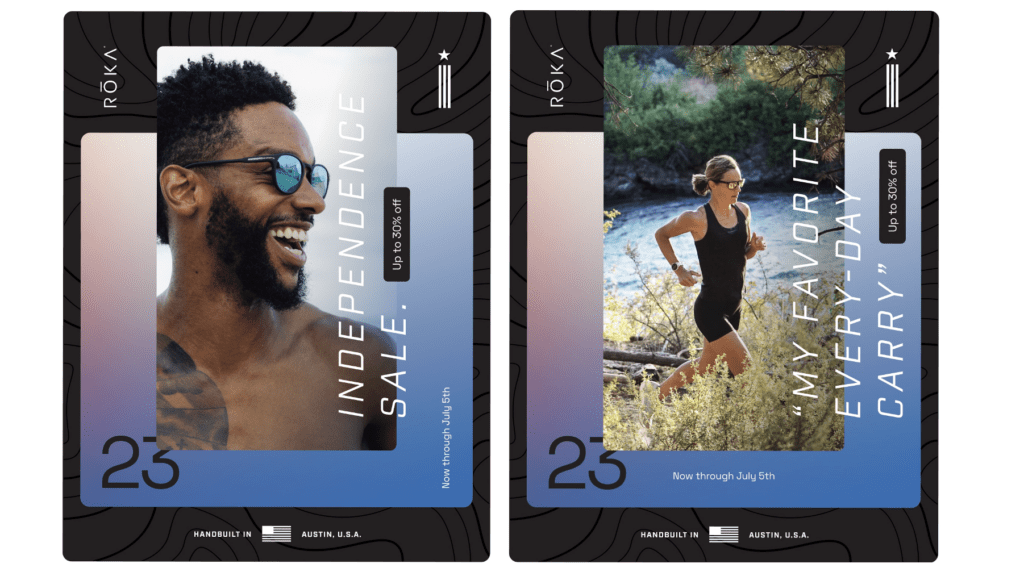ROKA Sports Inc. triggered concerns from the Federal Trade Commission (“FTC”) when it allegedly ran afoul of the consumer protection agency’s rules on “Made In USA” claims, according to a letter the agency sent to the company’s co-founder and CEO last month that stated it was closing its investigation after the company took steps to resolve the allegations. The Austin, Texas-based sportswear brand had advertised that its sunglasses were “Handbuilt in USA” and “Handbuilt in Austin, TX,” but the FTC said in a May 17 letter to the company’s co-founder and CEO Rob Canales that those claims potentially went beyond what the agency allows.
Since ROKA imports certain components of its eyewear products from foreign countries, the FTC stated that it had “concerns” that ROKA may have overstated exactly how American its products were. “Specifically, although ROKA broadly advertised its eyewear as ‘Handbuilt in USA’ or ‘Handbuilt in Austin, TX,’ certain products incorporated imported glasses frames, lenses, or other significant components,” the agency wrote in its letter to Canales.

The FTC letter went on to highlight how the agency gauges whether a company’s “Made” or “Built” in the USA claim goes too far and thus, violates FTC rules that prohibit companies from making false or misleading claims that a product is of U.S. origin. In accordance with its final rule on “Made in USA” and other unqualified U.S.-origin claims, the Commission looks at a number of factors to determine if a product is “all or virtually all” made in the U.S., including what proportion of manufacturing costs are attributable to U.S. parts and processing; “how far removed any foreign content” is from the finished product; and how important that foreign content or processing is to the overall function of the product.
ROKA responded to the FTC’s allegations by taking certain remedial actions that prompted the agency to refrain from pursuing further investigation. The company removed the U.S.-origin claims from its marketing materials; stickered over outdated claims on product packaging; updated the claims via third-party marketers; conducted a comprehensive review to confirm proper origin markings; and conducted compliance training. It also started to use “Assembled in USA” in certain advertising (instead of “Handbuilt in USA” and “Handbuilt in Austin, TX”), which the Commission said can work in a pinch.
With regard to “Assembled in USA” claims, the FTC clarified that a company may use this advertising language as long as it can show that any products associated with that claim were last “substantially transformed” in the U.S. and that the U.S. is where their principal assembly took place. Moreover, a company must be able to show that the relevant assembly operations that took place in the U.S. were substantial.
Because consumers are likely to believe that products with a “Made In USA” label were built entirely in the U.S., companies should convey “truthful information” on this front, the FTC asserted in its letter. In addition to “Assembled in USA,” companies can also make any qualified claim that is “truthful and substantial” in regard to its products. For example, a brand can alert consumers that foreign components were used in a product that was made domestically – “Made in USA of Imported Parts” – or also can identify the countries where the parts in question come from – “Made in USA from French and Korean Parts.”
Beyond that, claims that specify the proportion of the product that comes from the U.S., such as “60% U.S. Content, can work as well, according to the regulator.
THE BIGGER PICTURE: “Made in USA” claims can lead to big penalties if companies apply them inaccurately. For instance, in late April, San Francisco, CA-based Williams-Sonoma paid more than $3 million to settle an FTC complaint that alleged it misused the claim. In the original complaint, which the FTC filed in 2020, the agency required the home products and kitchenware company to pay $1 million due “false, misleading or unsubstantiated claims” related to its Goldtouch Bakeware, Rejuvenation, and certain Pottery Barn brand products.
“Many of us want to buy products that are made in the USA, and we trust companies like Williams-Sonoma to tell us the truth,” Andrew Smith, Director of the FTC’s Bureau of Consumer Protection, said in a March 2020 FTC statement announcing the order. “When a company falls short, we hold it accountable.”
More recently, the FTC finalized a separate order against Massachusetts- and New Hampshire-based companies Chaucer Accessories, Bates Accessories, and Bates Retail Group, along with their owner, Thomas Bates, in September 2023, for falsely claiming that certain products were manufactured in the U.S. in violation of the FTC Act.
Regulatory attention to “Made in USA” claims has increased in recent years, coinciding (in part) with companies’ efforts to rework their supply chains in light of enduring disruptions, including supply chain backlogs and other supply chain-related components, which saw an all-time high in 2021 during the COVID-19 pandemic and have not gone away since due to recent geopolitical tensions, according to the Global Supply Chain Pressure Index. As companies, including those in the retail segment, increasingly look to nearshore their manufacturing operations and/or reach consumers who are willing to pay a premium for products that are marketed as domestically manufactured, it is crucial for them to understand the rules surrounding “Made In USA” claims.











